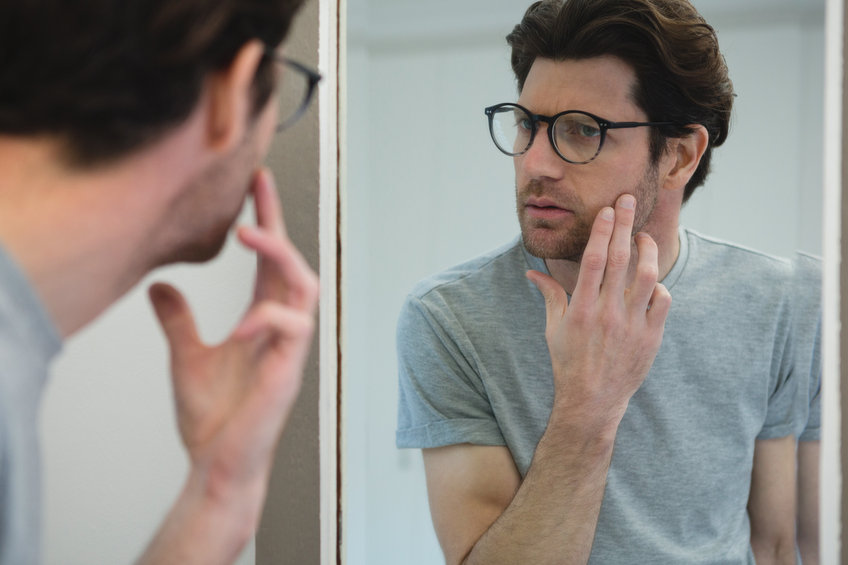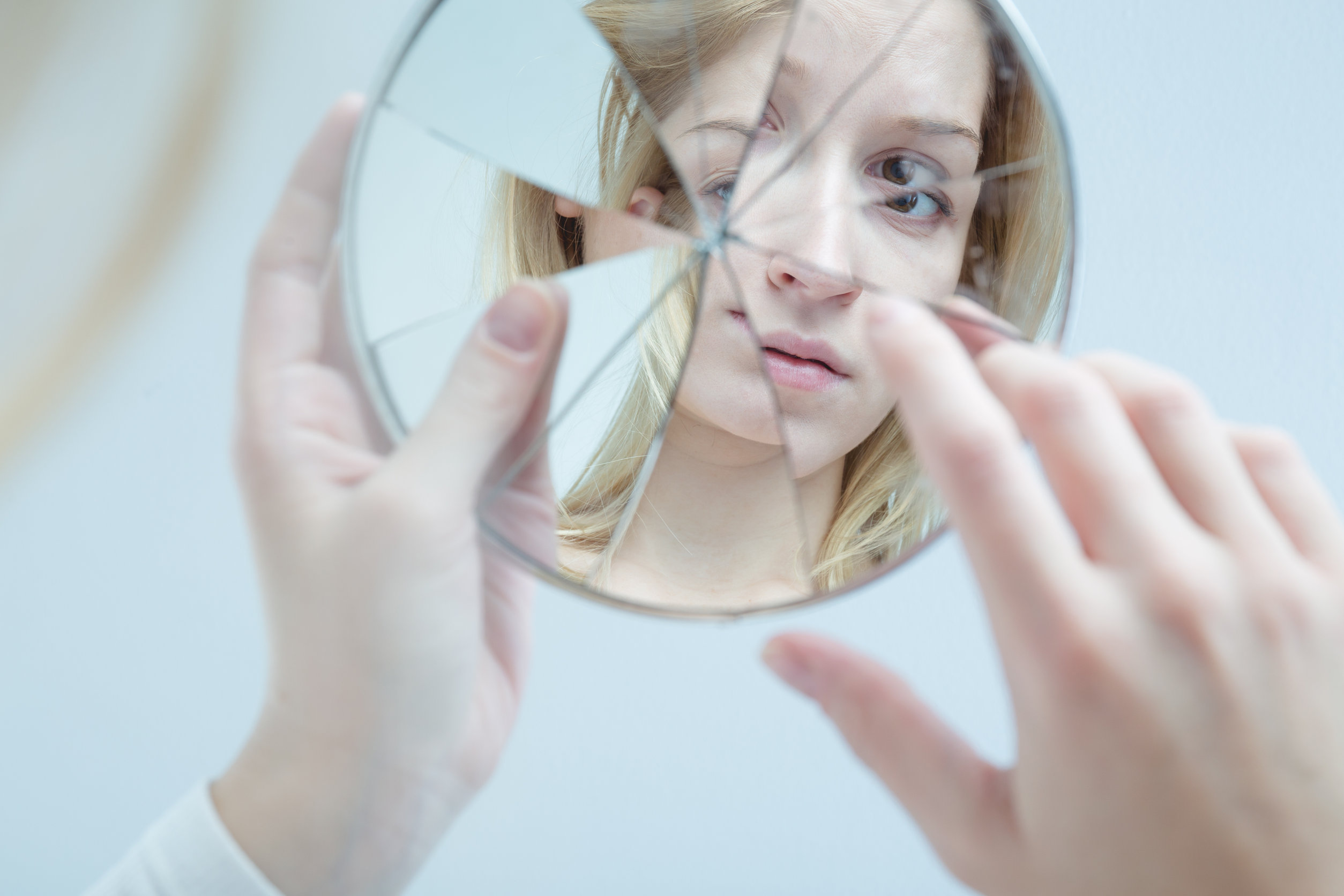Everybody has insecurities: those little things we view as imperfections that we may want to change or hide from others. The continuous barrage of images pushing a very specific ‘ideal’ only serves to emphasize these insecurities, which beauty companies and fad diet brands use to get their audience to spend billions of dollars each year. But what happens when these normal insecurities develop into something more?
Body dysmorphia, or Body Dysmorphic Disorder (BDD), is a disruptive and distressing preoccupation with perceived flaws. It changes the way we view ourselves, amplifying and exaggerating these ‘flaws’ in our minds. The image we see of ourselves in mirrors and photos is not what others see when they look at us. That in turn decimates self-image and self-worth, potentially leading to dangerous, harmful habits.
How do you identify the difference between this mental health disorder and normal insecurities? Keep reading to learn more about it, as well as treatment that can help you or your loved one change the way you think about and view your body.
Doesn’t Everyone Have Insecurities?
There is no such thing as perfection. With the heavily doctored and edited images and videos we see online and in the media that can be easy to forget. The reality is most people have some kind of insecurity about their appearance. More often than not, they are too busy worrying about their own to even notice yours. Learning to accept and appreciate what makes us unique is a journey; it doesn’t happen overnight. For some, that journey looks a little different from others.
Not everyone who has insecurities about perceived flaws qualifies for a diagnosis of body dysmorphia. When someone has Body Dysmorphic Disorder, their self-perception becomes warped and self-destructive. Occasional insecure thoughts become obsessive and hypercritical. They can be debilitating, disrupting their ability to complete simple tasks or maintain relationships.
What Are Symptoms of Body Dysmorphic Disorder?
Body Dysmorphic Disorder is more than not liking what you see in the mirror. Being able to recognize the signs and symptoms of BDD in yourself or a loved one can help begin the journey to recovery. As with many other mental and behavioral health disorders, the sooner you are able to get help, the better your chances of a successful outcome. Here are some telltale signs of body dysmorphia.

- Spending significant lengths of time on the way you look
- Obsessively checking your appearance in mirrors or reflective surfaces
- Avoiding mirrors and reflective surfaces because your appearance causes distress
- Comparing your looks to other people
- Constantly seeking external validation about your perceived flaws
- Avoiding social gatherings or spending time with loved ones because of your perceived imperfections
- Excessive grooming and preening that disrupts other activities
- Obsession with weight loss or gain or cosmetic procedures to ‘fix’ flaws
- Body checking behaviors
- Choosing clothes, accessories, or hair styles specifically to hide behind them or conceal an imperfection
Some signs of Body Dysmorphic Disorder can be misconstrued as vanity or fishing for compliments, earning negative responses from others. While some people may take exceptional pride in their appearance and enjoy when others acknowledge it, BDD is different. Someone with this mental health disorder spends a lot of time on their appearance but with a critical lens. They do not like what they see and consider themselves unattractive or repulsive even when others do not.
People with Body Dysmorphic Disorder may be displeased within their overall appearance or have a fixation on very specific body parts. This includes things like teeth, noses, chins, arms, legs, or the midsection. Like all mental health conditions, BDD affects each person differently and with varying levels of severity. If you think you may be experiencing some form of body dysmorphia, getting help can make a world of difference.
Why Does BDD Happen?
What causes some people to have body dysmorphia when others don’t? A 2010 study in the journal Psychiatric Annals looked into possible causes and contributors. This research looked at preliminary evidence that shows signs that various forms of childhood abuse may have a connection. This could include physical abuse, emotional abuse, sexual abuse or neglect.
In addition, it has been noted that this disorder tends to start in adolescence. Researchers note that the hormonal and physical changes that happen during this time may contribute. Other factors include social interactions like teasing that could play a role in a person’s self-perception.
While there is not a clear answer why, some research has shown a connection between people with BDD and heightened aesthetic sensitivity. In other words, they are more aware of indicators of visual beauty and appreciate them. Some research has also found a hyper-focus on details and visual processing that is different from the norm in those with BDD. Also, some evidence points to family history and serotonin levels having a part to play.
Overall, the researchers noted that more research is needed into this disorder, which shows itself to be a complex problem that may have many causes and contributors varying by the person.
What to Do if You Think You Have Body Dysmorphia
Ultimately, it’s best to see a qualified mental health professional to receive an assessment. This evaluation can go over your symptoms and your medical history, and provide an exam. If you are experiencing BDD, they can also help you decide the best course of care for treatment.
Because Body Dysmorphic Disorder may occur hand in hand with other conditions like eating disorders, it may be necessary to seek help from an eating disorder recovery center. Eating Disorder Solutions provides comprehensive, personalized treatment for eating disorders and co-occurring disorders. Our person-first approach to treatment means you receive the level of direct care you need to overcome body dysmorphia and other mental health challenges.
For more information about how we can help you, including an assessment for Body Dysmorphic Disorder, contact us today.



